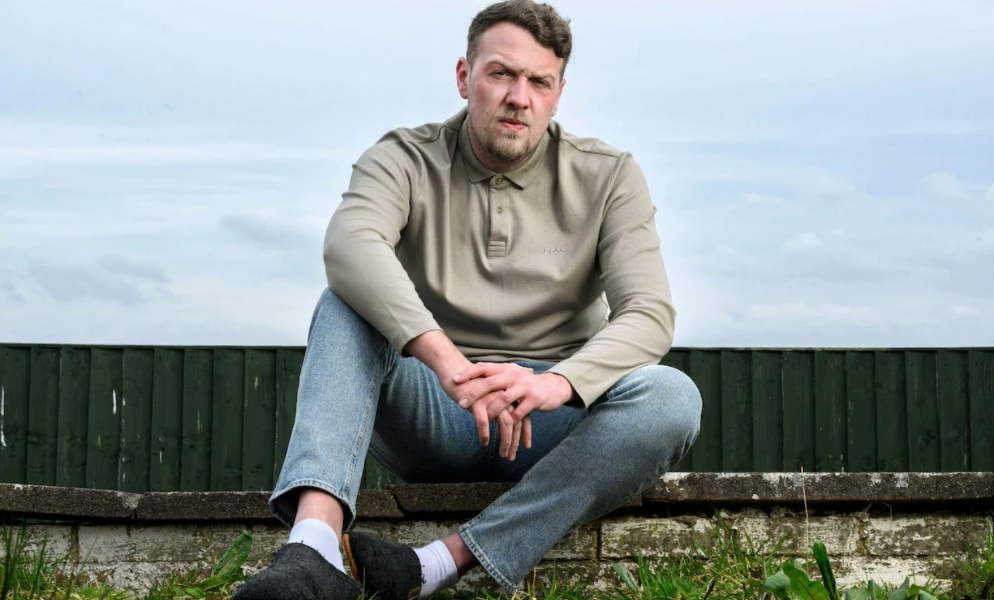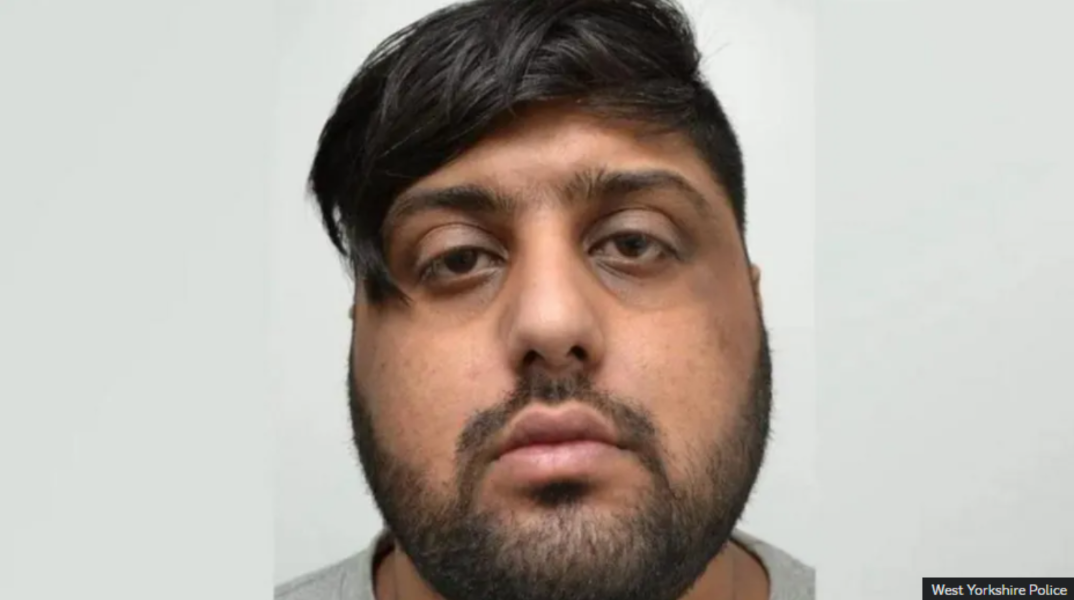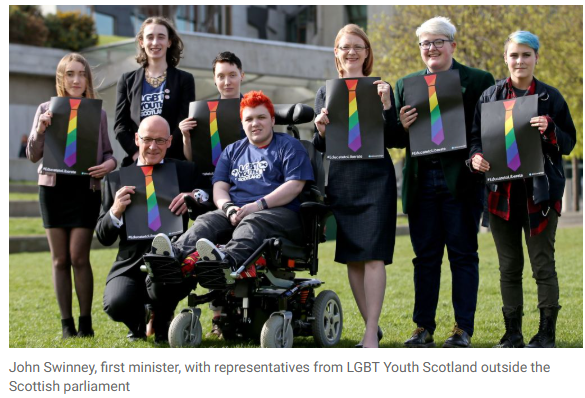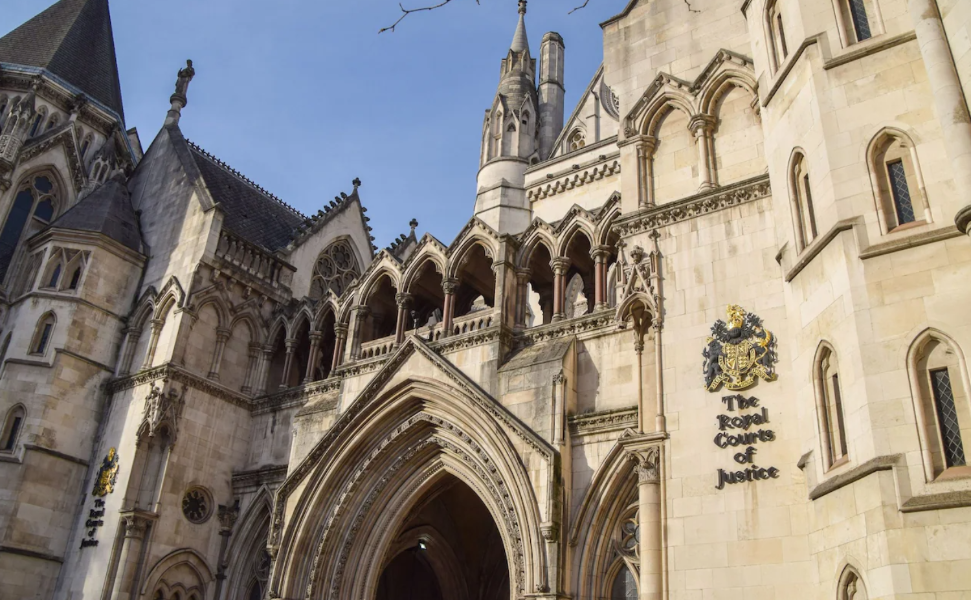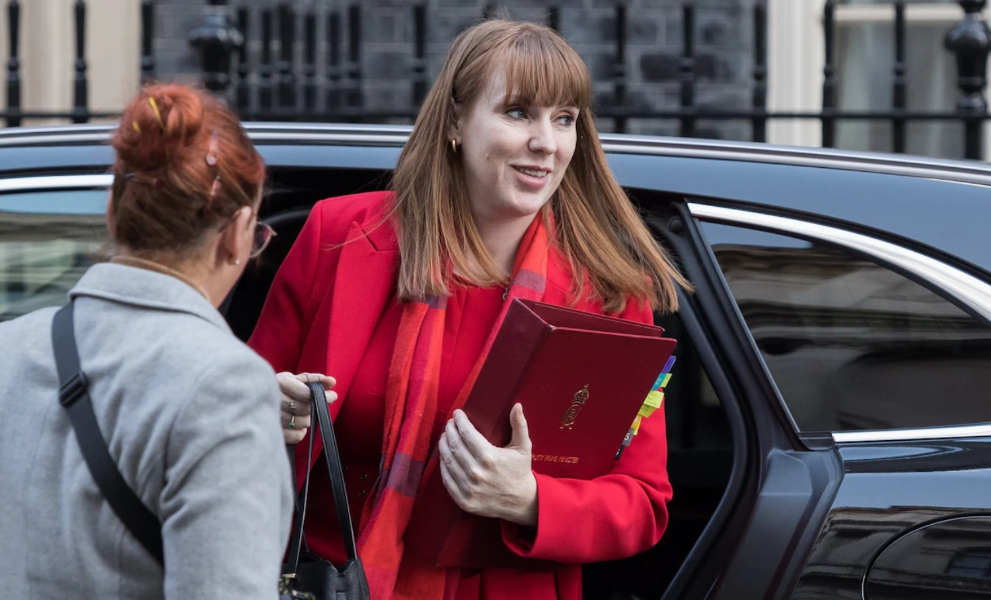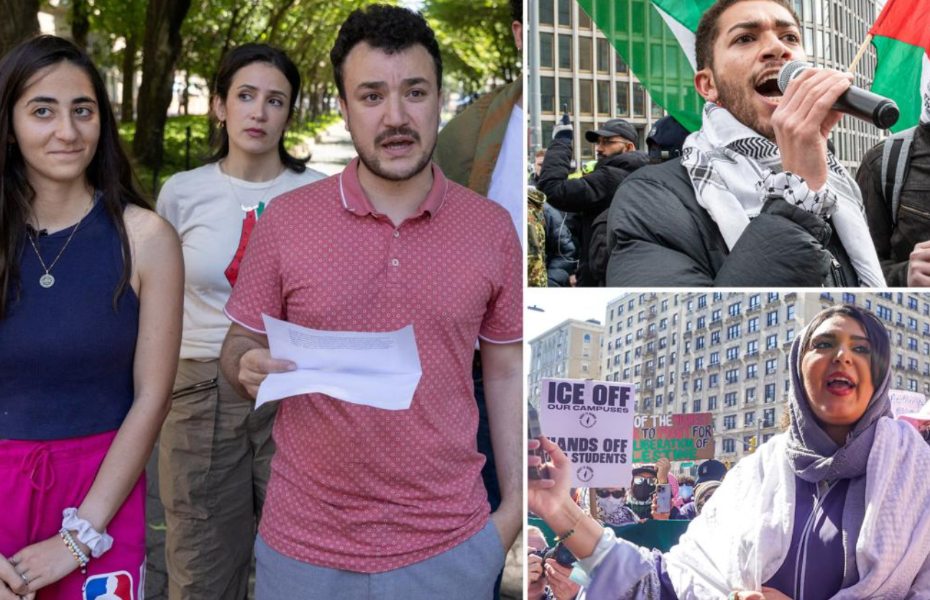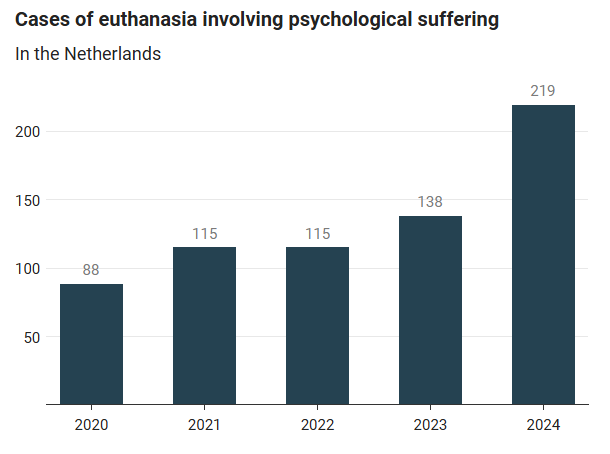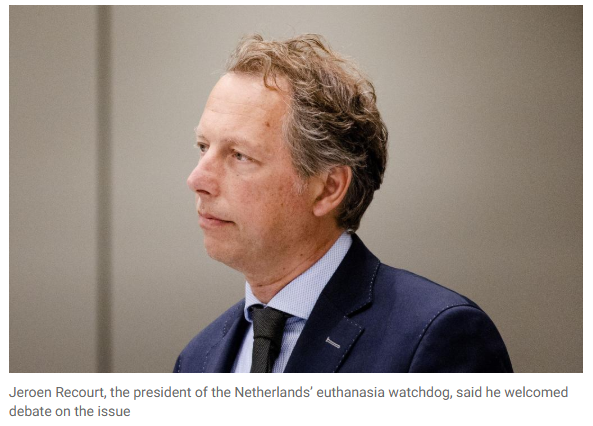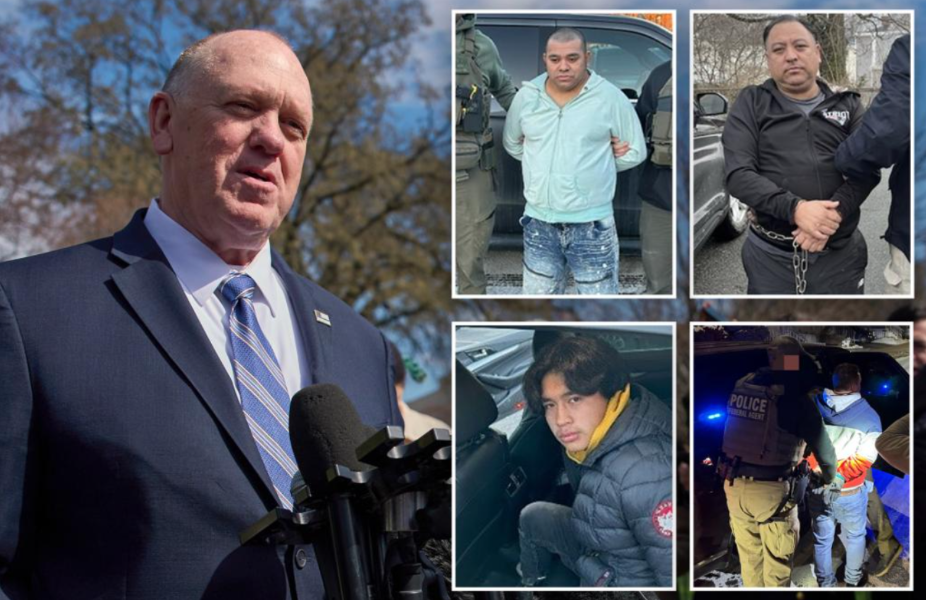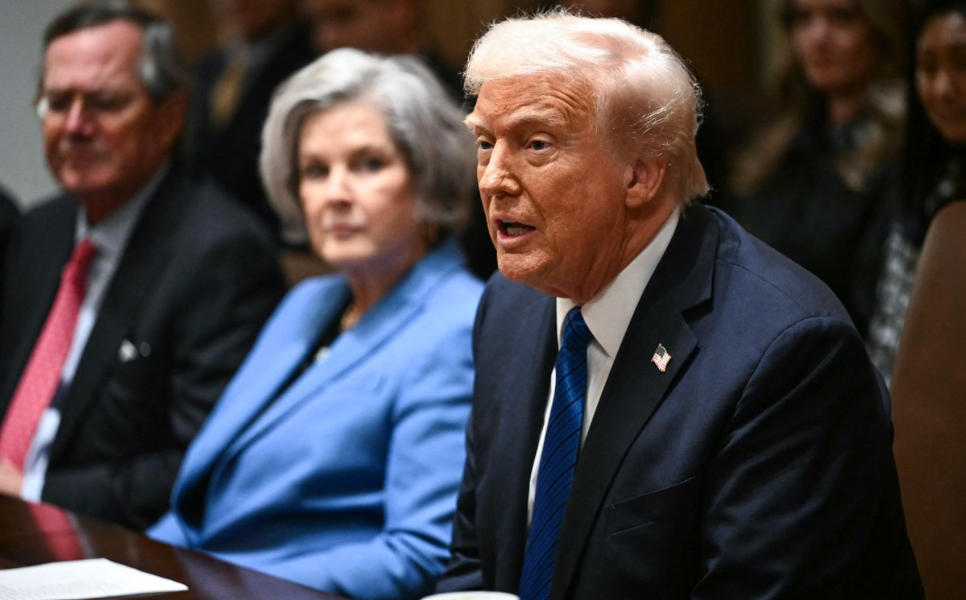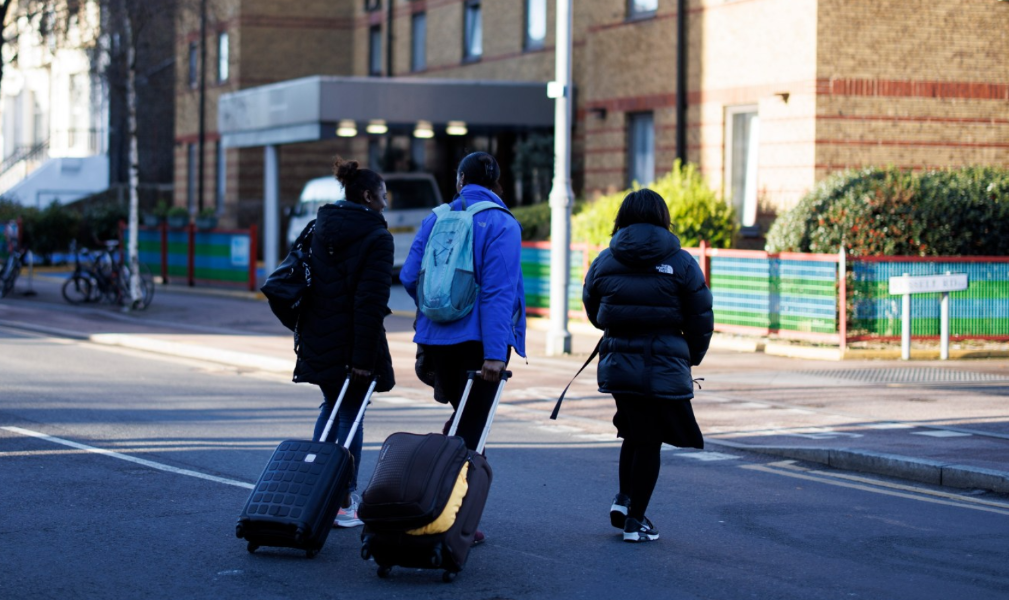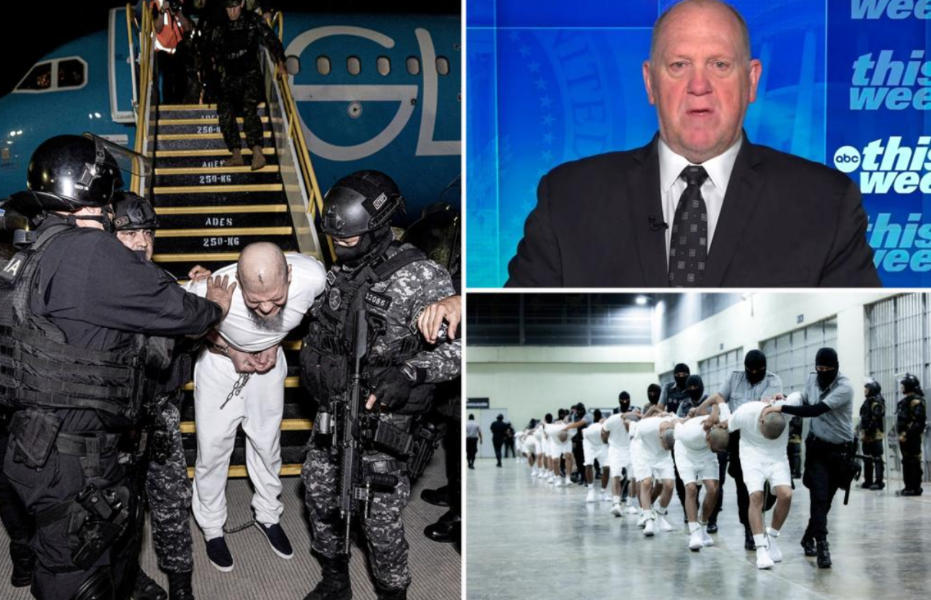-
Posts
9,975 -
Joined
-
Last visited
Content Type
Events
Forums
Downloads
Quizzes
Gallery
Blogs
Everything posted by Social Media
-
President Donald Trump announced on Wednesday a new plan to impose 25% tariffs on all imported cars, intensifying an ongoing global trade war just weeks after previous tariffs caused market turmoil and raised concerns about a possible recession. "I think our automobile industry will flourish like it hasn't before," Trump said. The newly announced tariffs will impact an industry that employs over a million workers in the United States and depends on a supply chain deeply connected to Mexico and Canada. Experts have previously warned that these tariffs could drive up car prices for American consumers. Earlier this month, Trump had already imposed 25% duties on a significant portion of U.S. auto imports from Mexico and Canada, though he later delayed some of those auto-related tariffs. White House press secretary Karoline Leavitt previewed the latest round of tariffs on Wednesday, leading to an immediate dip in U.S. stock markets. Following the announcement, the Dow Jones Industrial Average fell by 130 points, or 0.3%, while the S&P 500 declined 1.1%. The Nasdaq, which is heavily weighted toward technology stocks, dropped by 2%. The auto industry took a hit as well, with shares of Tesla, led by Trump advisor Elon Musk, closing down 5.5%, while General Motors saw a 3% decline. According to a Cato Institute analysis of data from the U.S. International Trade Commission, Canada and Mexico are the two largest suppliers of finished motor vehicles and car parts to the United States. In 2023, these two countries accounted for nearly $120 billion worth of U.S. motor vehicle imports, representing approximately 47% of all such imports for the year. A similar share of auto parts imports also came from Canada and Mexico, the analysis found. Trump’s latest tariffs come just days before he is expected to introduce a new wave of duties on April 2, a date he has referred to as "liberation day," signaling a major shift in U.S. trade policy. He has repeatedly stated that the new tariffs aim to establish reciprocal trade relationships. However, speaking at the White House on Monday, Trump suggested that the final rates might be adjusted based on the tariffs imposed on U.S. goods by other countries. "I may give a lot of countries breaks," Trump told reporters in the Oval Office. "I'm embarrassed to charge them what they've charged us." This latest move follows a series of tariffs Trump imposed earlier in March, including increased duties on Chinese imports, raising tariffs on goods from the country to 20%. Days later, he implemented sweeping tariffs on all aluminum and steel imports. These actions triggered retaliatory tariffs from China, the European Union, and Canada, fueling a trade war that has rattled financial markets and sparked fears of an economic downturn. Economists largely predict that tariffs will lead to higher prices for consumers, as importers typically transfer part of the tax burden to buyers. At a press conference in Washington, D.C., last Wednesday, Federal Reserve Chair Jerome Powell attributed a "good part" of recent inflation to the effects of tariffs. Based on a report by BBC 2025-03-27
-

Updates and events in the War in Ukraine 2025
Social Media replied to cdnvic's topic in The War in Ukraine
A post promoting the virtues of Trump or Putin being Alpha males has been removed along with an unapproved source @beautifulthailand99 The topic is also not about historical events inculding who the nuclear weapons belonged to in Ukraine before 1996, but is about: Updates and events in the War in Ukraine 2025 Any more diversion attempts will be removed -
President Donald Trump has signed an executive order that dramatically alters the U.S. election system by requiring individuals to provide proof of citizenship when registering to vote in federal elections. The order also includes broad changes to mail-in voting and election equipment, raising concerns about potential voter disenfranchisement and the legality of such sweeping reforms. Election law experts quickly pointed out that Trump’s directive is likely to face legal challenges, as courts have previously blocked states from imposing similar proof-of-citizenship requirements for federal elections. Under existing law, individuals registering to vote must swear under penalty of perjury that they are U.S. citizens. Legal experts argue that adding a documentary requirement could prevent millions of eligible voters from registering, particularly those without immediate access to the required identification. The order instructs the Election Assistance Commission (EAC), an independent federal body, to revise voter registration forms and mandate documents such as U.S. passports or government-issued IDs that explicitly confirm citizenship. However, only about half of Americans held passports as of last year, according to the State Department, and certain forms of identification listed in the order—such as REAL IDs and military identification cards—do not always indicate citizenship. Additionally, birth certificates are not included as an acceptable form of proof under the directive, further complicating the registration process for many eligible voters. Trump has long promoted the idea that noncitizens vote in U.S. elections, despite a lack of significant evidence supporting such claims. Federal law already makes it a crime for noncitizens to vote, and election officials routinely review records to ensure compliance. Legal scholars swiftly criticized the executive order, asserting that Trump lacks the authority to impose these changes. “A whole lot of this is illegal,” said Sean Morales-Doyle, director of the Voting Rights Program at the Brennan Center for Justice at NYU School of Law. He noted that the president does not have jurisdiction over the Election Assistance Commission or the management of elections. Justin Levitt, a constitutional law scholar at Loyola Law School, echoed this view, stating, “The president’s got almost no power over federal elections. One of the things that was very clear during my time in the last administration is how little authority the president has over elections—by design.” The Constitution delegates election oversight to Congress and the states, granting them control over the "times, places, and manner of holding elections." Republican lawmakers have also pursued a legislative path toward a proof-of-citizenship requirement with the introduction of the SAVE Act. Unlike Trump’s order, the bill would allow voters to use birth certificates to verify citizenship. However, election officials and voting rights advocates argue that such measures still risk disenfranchising voters who lack access to their documents. Beyond voter registration requirements, the executive order makes additional sweeping changes to election procedures. It prohibits the use of voting machines that rely on QR codes, potentially forcing states to replace costly election equipment. It also mandates that all ballots must be received by Election Day, directly challenging states that currently allow mail-in ballots postmarked by Election Day to be counted if received later. The order further directs the Department of Government Efficiency and other federal agencies to scrutinize state voter rolls in an effort to identify ineligible voters. Levitt pointed out that past Republican efforts to uncover widespread voter fraud have largely been unsuccessful, raising questions about the feasibility of such a directive. With legal challenges expected to mount, the executive order’s future remains uncertain. Experts anticipate that courts will once again intervene, as they have in previous cases involving voter registration and election law changes at the federal level. Based on a report by NBC News 2025-03-27
-
Prince Harry has expressed his shock after stepping down as patron of Sentebale, the charity he co-founded to support young people with HIV and AIDS in Lesotho and Botswana. His resignation follows a dispute between the charity’s board of trustees and its chair, Sophie Chandauka, who has taken legal action to remain in her role. Harry, the younger son of King Charles, established Sentebale in 2006 alongside Prince Seeiso of Lesotho, naming it after the local word for "forget-me-not" in memory of his mother, Princess Diana, who passed away in a Paris car crash in 1997. The organization has played a significant role in supporting vulnerable children in southern Africa, a cause close to the prince’s heart. The charity is now facing turmoil, as both Harry and Prince Seeiso have left their roles, along with the entire board of trustees. In a joint statement, they expressed sadness over their departure, stating it was “with heavy hearts” that they had made the decision “until further notice.” They emphasized that the trustees had acted in the best interests of the organization in calling for the chair to step down. “Although we may no longer be patrons, we will always be its founders, and we will never forget what this charity is capable of achieving when it is in the right care,” the statement read. The details surrounding the internal conflict remain unclear, but Chandauka responded with strong remarks, seemingly aimed at Prince Harry. “Everything I do at Sentebale is in pursuit of the integrity of the organisation, its mission, and the young people we serve,” she stated, as reported by Britain’s PA Media news agency. She claimed to have reported the trustees to the UK’s Charity Commission and alleged that a UK court had issued an injunction preventing her dismissal. However, a source familiar with the situation told CNN that no such court order had been issued. Chandauka’s statement went further, making pointed accusations. “My actions are guided by the principles of fairness and equitable treatment for all, regardless of social status or financial means. There are people in this world who behave as though they are above the law and mistreat people, and then play the victim card and use the very press they disdain to harm people who have the courage to challenge their conduct.” She framed the dispute as “the story of a woman who dared to blow the whistle about issues of poor governance, weak executive management, abuse of power, bullying, harassment, misogyny, misogynoir – and the coverup that ensued.” For Harry, this resignation marks the end of a deeply personal commitment. Since stepping down from royal duties in 2020 and relocating to California with his wife, Meghan, and their two children, he has maintained his support for many of his charitable projects, including Sentebale. His decision to step back is a significant blow, given his long-standing dedication to the charity. Harry first became inspired to help Lesotho’s vulnerable youth during a visit to the kingdom in 2004. The country has some of the world’s highest HIV and AIDS rates, and in 2020, Harry reflected on his deep connection to the cause, saying he had been “struck by the hardship and challenges so many children faced.” He described Sentebale as a tribute to both his own mother and Prince Seeiso’s late mother. Over the years, Harry has returned to Lesotho multiple times, most recently in October, when he attended a fireside discussion about the charity’s impact. His work in Africa extends beyond Sentebale, as he has long championed various humanitarian efforts across the continent. Britain’s Charity Commission has acknowledged concerns about Sentebale’s governance and is currently “assessing the issues to determine the appropriate regulatory steps.” Meanwhile, Sentebale has not formally accepted resignations from its royal patrons and has described the situation as part of an ongoing “recalibration of the board” in line with the charity’s “ambitious transformation agenda.” Based on a report by CNN 2025-03-27
-

Speaking the truth is now a risky business in Britain
Social Media replied to Social Media's topic in World News
A number of trolling posts removed including misleading information. The topic. The Dangerous Cost of Speaking the Truth -
The Dangerous Cost of Speaking the Truth In modern Britain, calling out the obvious has become a risky business. There should be nothing controversial about condemning a terrorist group as “disgusting.” Yet, time and again, people are being punished for speaking plain truth. Take NHS nurse Jennifer Melle, for example. She was reprimanded by her hospital in Surrey for referring to a male paedophile as “Mr.” The individual, known only as Patient X, identifies as a woman. He is also a convicted child sex offender. Yet it was Melle, not the criminal, who faced consequences. Her crime? Stating biological reality. When the offender was brought to her hospital for treatment, she called him “Mr.” That sounds both polite and factually accurate. But in today’s Britain, preferring truth over fantasy is apparently an offence worthy of punishment. Now, another case has emerged. Damon Joshua, a sewage worker, lost his job at Severn Trent Water after he condemned Hamas. Marking the first anniversary of Hamas’s October 7 attack, he posted an image of the Israeli flag on an internal staff site along with his thoughts. “It’s a year since Israel was horrifically attacked by a group of violent and disgusting terrorists,” he wrote. He urged colleagues to “stand in solidarity” with their “Jewish, Israeli and Zionist” peers against “the evils of Islamist terror.” The response? His post was removed by management, who claimed that “the terminology was very derogatory.” In other words, it is now unacceptable to be rude about Hamas. Apparently, offending a convicted paedophile or a terrorist organization is a graver offence than their own actions. Welcome to Britain, where acknowledging biological reality or calling terrorists “disgusting” can get you in trouble. Once, you had to say something genuinely offensive to be reprimanded. Now, simply stating the truth is enough to land you in hot water. The basic facts—that men are men and terrorists are vile—are now controversial. The case of Damon Joshua is particularly revealing. If there is one thing almost everyone should agree on, it is that Hamas are bad people. Legally, this is indisputable: Hamas is designated a terrorist organization in the UK. And yet, declaring this publicly is enough to spark outrage. Activist Niyak Ghorbani has learned this the hard way. Born in Iran, he regularly attends “pro-Palestine” marches in London, holding a placard that reads “Hamas is Terrorist.” The result? He has been jeered at, shoved, and even arrested by the Met Police—not for breaking the law, but for his “own safety.” The police justified their actions by saying they wanted to “prevent a breach of the peace.” What they really did was silence a man for stating what UK law already affirms. If law enforcement were doing their job properly, they wouldn’t be targeting people like Ghorbani. Instead, they should be asking why certain groups become violent at the mere mention of Hamas’s terrorist status. It is now seen as controversial—even suspicious—to call Hamas terrorists. Some on the left prefer to use words like “resistance” or “fighters,” as if Hamas were merely engaged in a noble struggle. The BBC, too, has infamously avoided calling Hamas what they are. Shortly after the October 7 attack, BBC journalist John Simpson insisted that it was not the network’s role to tell people “who are the good guys and who are the bad guys.” Yet, when it comes to Brexit voters or Trump supporters, the BBC has never shied away from making moral judgments. Somehow, when it comes to Hamas, neutrality is suddenly paramount. Why this hesitation? Part of it stems from deep-seated anti-Israel sentiment among certain influential circles. Many dislike Israel so intensely that they refuse to condemn the group that regularly terrorizes it. But there is another factor at play: the fear of being labeled “Islamophobic.” British society has become so anxious about offending Islam that even criticizing Islamist terrorism has become taboo. Many people now believe that anything linked to Islam—whether it be the niqab, grooming gangs, or Hamas—must be handled with extreme caution. The growing push for Labour’s new definition of “Islamophobia” will only make this worse. If implemented, it could become even harder to discuss issues that reflect poorly on Islam, even when those issues involve terrorism. It’s time to push back against this absurdity. Reality must be defended. If you have a penis, you are a man. And if you pick up a gun to kill Jewish civilians, you are a disgusting terrorist. Based on a report by The Telegraph 2025-03-26
-

Israel Hamas War the Widening Middle East Conflict
Social Media replied to Social Media's topic in The War in Israel
UPDATE: Gaza Residents Stage Rare Protests Against Hamas, Demand End to War In a rare display of dissent, hundreds of Palestinians took to the streets in multiple locations across Gaza on Tuesday to protest against Hamas rule and call for an end to the ongoing war. Demonstrators, chanting slogans such as “Hamas out” and “We want to eat,” expressed their frustration with the terror group’s governance and the devastating toll of the conflict. Footage from Beit Lahia, a town in northern Gaza, showed hundreds of residents holding signs reading “Stop war” and “Children in Palestine want to live.” Protesters chanted against Hamas, labeling its members as “terrorists” and demanding their removal from power. Other demonstrations erupted across the Strip, with reports of gatherings in front of the Indonesian Hospital, where some protesters waved white flags as a symbol of peace. Large protests against Hamas's fascism in Gaza today, with thousands demanding dignity, an end to the war & destruction, and calling on the terror group to "get out." Listen to Palestinians in Gaza; cover these demonstrations; be their voice; amplify their cries. Down with Hamas! Later in the day, another demonstration broke out in the Jabalia refugee camp, where dozens of protesters burned tires while chanting, “We want to eat.” As news of the protests spread, further demonstrations were reported, including in Khan Younis, a major city in southern Gaza, where residents were filmed chanting “Down with Hamas” and calling for an end to the fighting. Although Hamas did not release an official statement regarding the protests, some media outlets in Gaza affiliated with the group framed the demonstrations as “protests for stopping the war,” deliberately omitting the calls for Hamas’s removal. Public dissent against Hamas is uncommon in Gaza due to the group’s strict control over the territory, which it has ruled since violently ousting the Palestinian Authority nearly two decades ago. While individual expressions of frustration have become more frequent since the war began, large-scale demonstrations against Hamas remain rare. However, these latest protests highlight growing dissatisfaction among Gaza’s residents as they grapple with the ongoing violence and humanitarian crisis. Based on a report by NYP 2025-03-26 -

Updates and events in the War in Ukraine 2025
Social Media replied to cdnvic's topic in The War in Ukraine
@frank83628 yet another troll post has been removed, yet another of your posts that offers nothing to the topic of discussion other than deflect a credible link. Once more and you will also be removed yet again. -
A nursing assistant who meticulously planned to bomb a hospital and an RAF base has been sentenced to life in prison. Mohammad Farooq, 29, of Hetton Road in Leeds, had intended to carry out a devastating attack at St James's Hospital in January 2023 after previously plotting to target RAF Menwith Hill near Harrogate. A terrorist who planned to blow up Leeds Hospital & RAF base has been sentenced to life in prison. Mohammad Farooq, 29, walked into Leeds hospital with pressure cooker he planned to blow up the hospital where he worked. Farooq was jailed for a minimum of 37 years in prison. Farooq was found guilty at Sheffield Crown Court of preparing acts of terrorism. During the trial, jurors heard how he sought to “kill as many nurses as possible” by detonating a pressure cooker bomb inside the hospital. At sentencing, Mrs Justice Cheema-Grubb imposed a life sentence with a minimum term of 37 years. The judge emphasized that nearly 10 kilograms of explosives had been packed into the device, highlighting the potential devastation. "You were disillusioned in your own life, both personally and professionally, having failed to achieve the standard of work to become a nurse," the judge remarked. The court heard that Farooq had been consuming “anti-West propaganda” on TikTok and had downloaded terrorist manuals, including instructions on how to construct a bomb. Despite being employed as a nursing assistant at the hospital, Farooq harbored deep resentment towards colleagues. In a chilling move, he sent a text message to a nurse, falsely claiming there was a bomb on the ward. The prosecution argued that this was not an attempt to warn staff and patients, but rather to trigger an evacuation so he could maximize casualties. "He wanted to detonate the bomb when the canteen was full of nurses and walk out," the judge stated. However, his attack was thwarted by a passerby, patient Nathan Newby, who engaged him in conversation outside the hospital and ultimately diffused the situation. The judge praised Mr. Newby’s intervention, calling his courtroom testimony “the most remarkable the court has ever heard.” She stated that Farooq openly admitted his intent to kill during their exchange. "The kind thoughtfulness of a passing stranger saved you and the people you targeted," she told Farooq. "Mr. Newby’s actions prevented an atrocity." During the trial, the court also learned that Farooq had initially set his sights on RAF Menwith Hill, believing it to be a viable target due to its association with UK and US military intelligence. However, he abandoned the plan, fearing the base was too well protected, and instead turned his attention to the hospital. Farooq was arrested outside St James’s Hospital with the pressure cooker bomb, which was reported to be twice as powerful as those used in the 2013 Boston Marathon attack. Prosecutors described his radicalization, stating that he had become immersed in an “extremist Islamic ideology” and was seeking “his own martyrdom” through mass murder. Jonathan Sandiford KC, the lead prosecutor, also noted that Farooq had a history of grievances against former colleagues and had engaged in a campaign of harassment against them. Det Supt Paul Greenwood, head of investigations for Counter Terrorism Policing North East, commended the sentencing, stating: “Farooq came dangerously close to harming innocent people. Thanks to the bravery of Nathan Newby, he never fully realized his plans and has instead been forced to face the long-term consequences of his extreme ideology and deep-seated grievances.” Prof. Phil Wood, chief executive of Leeds Teaching Hospitals NHS Trust, reflected on the harrowing events of that morning. “Today's sentencing helps us continue to move on from the events of that day. It was an extremely difficult time for staff and patients, and I remain immensely proud of the calm and professional way in which they responded to keep everyone safe.” He expressed gratitude to law enforcement and reiterated his appreciation for Mr. Newby’s courageous actions. “I would again like to thank the police for their support during the incident and throughout the investigation, and I am extremely grateful to Nathan Newby for his courage and initiative that morning.” Farooq will now spend at least 37 years behind bars, serving time for a crime that could have led to mass casualties if not for the quick thinking of an ordinary citizen. Based on a report by BBC 2025-03-26
-

LGBT Youth Scotland Faces Backlash Over Self-Harm Guidance
Social Media posted a topic in World News
LGBT Youth Scotland, a taxpayer-funded charity operating in schools across Scotland, has come under fire after a whistleblower alleged that volunteers were instructed to advise self-harming children to use “clean razor blades” rather than discouraging them from harming themselves. According to the whistleblower, managers at the charity defended the practice, arguing that if self-harm was a child’s “coping mechanism,” it would be wrong to “take that away from them.” The individual, who had applied to volunteer with the organization, described these instructions as “shocking and callous.” They stated that when they questioned the policy in October 2023, they were dismissed by managers who insisted that some children had no other way of coping. The whistleblower feared that such guidance could easily be misinterpreted by vulnerable young people as encouragement to continue self-harming. The complaint was reported to the Office of the Scottish Charity Regulator (OSCR), which launched an inquiry into LGBT Youth Scotland. While the regulator has since dropped the investigation, it confirmed that it had engaged with the charity on the issue and that policies had been reviewed. However, OSCR declined to specify what changes had been made, stating only that it was “satisfied” with the charity’s response. The complaint about self-harm guidance was one of 13 concerns raised about LGBT Youth Scotland, obtained by The Times through a freedom of information request. Other concerns focused on the charity’s support for puberty blockers and its promotion of gender ideology in schools. Despite safety concerns leading to the ban of puberty blockers in certain cases, LGBT Youth Scotland had previously described such medical treatments as “wonderful.” The charity receives over £1 million in taxpayer funding annually and is active in hundreds of schools. In addition to its work promoting LGBT inclusion, it operates youth groups, one-on-one support services, and an online chat service for children. Critics argue that its increasing influence in Scottish schools is contributing to what they describe as a “systematic erosion of child safeguarding.” Ash Regan, an Alba Party MSP and former SNP minister, raised concerns in the Scottish Parliament about the role of LGBT Youth Scotland in education. “Mental health issues are serious, requiring professional clinical support, not left to volunteers trained in normalising dangerous practices,” she said. Regan also criticized OSCR for its lack of transparency regarding the inquiry and questioned who was overseeing the real-world impact of organizations like LGBT Youth Scotland on children. The controversy over self-harm advice is just one in a series of scandals linked to the charity. Last year, Rosie Millard, chairwoman of the BBC’s Children in Need, resigned over the organization’s handling of a £466,000 grant awarded to LGBT Youth Scotland. She accused Children in Need’s chief executive, Simon Antrobus, of “dithering and delay” before ultimately cutting ties with the charity due to fears of bad publicity. LGBT Youth Scotland has also faced scrutiny over past associations with individuals convicted of child abuse. In 2009, its former chief executive, James Rennie, was jailed as part of what was then described as Scotland’s largest paedophile ring. More recently, it emerged that convicted sex offender Andrew Easton had contributed to a “coming out” guide for the charity in 2010. Easton, who was not an employee or volunteer of LGBT Youth Scotland, later pleaded guilty to sharing indecent images of children, including babies. In response to the ongoing criticism, LGBT Youth Scotland recently updated its articles of association, seemingly expanding its remit beyond its previous focus on supporting 13 to 25-year-olds. OSCR stated that it had not needed to use its formal powers in its investigation, meaning it was not required to publish a report on its findings. It insisted that it was satisfied with the charity’s response, which included reviewing and updating key policies. However, there remains confusion over whether the specific complaint about self-harm guidance was addressed. OSCR stated that it had engaged with the charity on the matter, while a spokesman for LGBT Youth Scotland suggested that the complaint had not been part of the review. The spokesman said: “Some complaints that OSCR will have received will not have been shared with LGBT Youth Scotland as they will have deemed them either unsubstantiated or unverifiable, irrelevant, or outside of the purview of a tightly governance-focused inquiry.” Despite the regulator’s assurances, concerns about LGBT Youth Scotland’s influence in schools continue to grow. Critics argue that an organization receiving substantial public funding must be subject to greater scrutiny, particularly when dealing with vulnerable children. The allegations surrounding self-harm guidance have only intensified the debate over the charity’s role in Scottish education and child safeguarding. Based on a report by The Times 2025-03-26 -
The Labour government’s proposal to impose VAT on private school fees faces a significant legal challenge that could ultimately force Sir Keir Starmer and his cabinet to abandon the controversial policy. Next week, some of the country’s most respected legal minds will present arguments before the High Court, questioning whether the tax violates fundamental rights protected under the European Convention on Human Rights (ECHR). This case raises broader concerns about parliamentary sovereignty, the role of education in society, and the rights of children. Should the government lose, it would not only be an embarrassment for Starmer but a potentially devastating blow to Education Secretary Bridget Phillipson and Chancellor Rachel Reeves. Many misunderstand what would happen in the event of a loss. Contrary to government claims, the courts would not be overturning a taxation policy. Instead, the ruling would likely result in a “declaration of incompatibility,” acknowledging that the tax conflicts with existing laws, including Education Acts, charity legislation, and human rights protections. Labour itself has committed to upholding human rights in its manifesto, further complicating its position. The law is clear: no child should be denied access to education or discriminated against based on their special educational needs or their parents’ religious beliefs. If the court finds the VAT policy incompatible with these principles, the issue would return to Parliament for resolution. This would reaffirm, rather than undermine, democratic governance. Even if the UK were to leave the ECHR, it is expected that a British Bill of Rights would preserve these fundamental protections. A central criticism of this legal challenge is that human rights law should not have the power to overturn a tax policy that has parliamentary approval and was part of Labour’s election manifesto. However, this argument misrepresents the case. A ruling against the government would not repeal the tax but would require Parliament to address the legal conflict, reinforcing democratic principles rather than eroding them. Another common misconception is that the case is about a supposed right to attend elite private schools such as Eton. That is not the issue at hand. The claimants argue that the tax disproportionately affects special needs students and families with religious convictions, including several Christian schools involved in the case. Wealthier institutions will likely absorb the cost increase, while smaller schools and vulnerable families will suffer the most. Ironically, the policy may shield elite schools from competition by allowing them to pass on VAT while reclaiming it on capital expenses. Education is compulsory, which means children have certain rights. A child with special needs cannot simply be placed in an unsuitable school. Similarly, a Jewish child cannot be forced into a Christian school, and vice versa. These rights are deeply embedded in British legal history and have long been upheld in a pluralistic society that values diversity in education. For centuries, education has been legally recognized as a charitable purpose, much like welfare and religion. Schools, along with nurseries and universities, have traditionally been exempt from taxation as part of a social contract that acknowledges their public benefit. The idea that parents who choose to educate their children privately should be penalized is a departure from this long-standing norm. This approach is not unique to Britain—most Western nations exempt education from taxation. Even in New Zealand, where a small tax is levied on school fees, it is offset by a tax credit. The government’s decision to impose VAT on school fees midway through an academic year has already had dire consequences. Schools have closed, children have been forced to leave their schools, and in many cases, there are no suitable alternatives available. This is not just an inconvenience—it is a reckless policy that undermines well-established rights and disrupts the lives of families across the country. A more measured approach would have been to implement the policy gradually, with exemptions for certain schools and students. Instead, the government appears to have introduced the measure hastily, without proper consideration of its impact. Claims that it will raise £1.6 billion for state schools have been widely challenged. The real outcome has been chaos, with additional strain placed on the already struggling special needs education system. Given the strength of the legal arguments against the VAT plan, there is a significant possibility that the government will lose this case. If that happens, the responsibility will fall squarely on the shoulders of Bridget Phillipson, whose mishandling of the issue may force Labour to reconsider its approach. Based on a report by The Telegraph 2025-03-26 Related Topics: Private Schools Struggle as Labour’s VAT Policy Triggers Closures Looming Crisis: Private Schools Face Closures Amid VAT Hike Top Oxfordshire Prep School to Close Amid Controversial VAT Policy on Private Education England’s Special Educational Needs Crisis: A System in Desperate Need of Reform Legal Challenge Against Private School VAT Policy Deems It Discriminatory
-
Under a new definition proposed by Deputy Prime Minister Angela Rayner, individuals from various faith groups—including Sikhs, Hindus, Jains, Buddhists, and even atheists—could be recognized as victims of Islamophobia if they are perceived as Muslim. Rayner’s initiative aims to broaden the scope of protections against anti-Muslim hatred by ensuring that those mistakenly identified as Muslim are also covered. As part of this effort, Rayner has established a working group to provide recommendations on defining and addressing Islamophobia. The five-member advisory panel, chaired by former Conservative Attorney General Dominic Grieve, will guide ministers on the appropriate language to describe and combat discrimination targeting Muslims or those assumed to be Muslim. The group's terms of reference, published on Monday, emphasize that their work will also consider the merits of adopting a formal, non-statutory definition of Islamophobia. The document states: “This should include advice regarding the merits of government adopting a non-statutory definition of unacceptable treatment of Muslims and anyone perceived to be Muslim, including what a proposed definition should be.” Rayner’s proposal follows previous controversies surrounding attempts to define Islamophobia. Critics have argued that past definitions were overly broad, risking constraints on free speech, effectively creating a de facto blasphemy law that could suppress legitimate criticism of Islam. However, Rayner maintains that the new definition will balance protections against discrimination while upholding the right to free speech. She underscored the necessity of such measures, noting that “too many British Muslims have faced discrimination and hatred due to their religion.” The terms of reference further recognize that individuals from other religious or non-religious backgrounds often face hostility due to mistaken identity. “There are often cultural markers which are adopted by wider faith communities like Sikh, Hindu, Jain, and Buddhists which are used to attack communities that are mistakenly identified as Muslim. This is also true of people of no faith,” the document states. Anticipating concerns over free expression, the terms explicitly reaffirm the right of British citizens to critique religious beliefs and practices. “Any proposed definition must be compatible with the unchanging right of British citizens to exercise freedom of speech and expression – which includes the right to criticise, express dislike of, or insult religions and/or the beliefs and practices of adherents,” the document clarifies. The working group will operate behind closed doors, with its advice remaining confidential. According to the terms of reference, the group will meet monthly, providing private updates to ministers without making its deliberations public. Alongside Grieve, the panel includes Professor Javed Khan, managing director of the think tank EQUI and former head of Barnardo’s; Baroness Shaista Gohir, chief executive of the Muslim Women’s Network UK; Akeela Ahmed, co-chair of the British Muslim Network; and Asha Affi, an independent consultant. Grieve has previously engaged in discussions on Islamophobia, having written the foreword to a 2018 report by an all-party parliamentary group, co-chaired by Wes Streeting. The report, adopted by the Labour Party, defined Islamophobia as “rooted in racism” and described it as “a type of racism that targets expressions of Muslimness or perceived Muslimness.” At the time, Grieve praised the report for its thorough research and contribution to the debate on tackling Islamophobia. Grieve’s political history also includes a notable clash with former Prime Minister Boris Johnson, who stripped him of the Tory whip in 2019 after he rebelled against Brexit legislation. He later ran as an independent candidate in the general election that year. With Rayner’s working group now moving forward, the debate over the definition of Islamophobia—and its implications for free speech—continues to be a contentious issue in British politics. Based on a report by The Telegraph 2025-03-26 Labour’s Islamophobia Policy
-
A lawsuit filed on Monday in the Southern District of New York accuses several American nonprofit organizations and anti-Israel activists of providing direct assistance to Hamas, a designated Foreign Terrorist Organization. The complaint alleges a coordinated effort between these groups and individuals to support Hamas through propaganda and recruitment efforts. The lawsuit names Columbia University Apartheid Divest (CUAD) and its spokesperson, Columbia graduate Mahmoud Khalil, who was detained by Immigration and Customs Enforcement on March 8. Other defendants include Nerdeen Kiswani, co-founder of Within Our Lifetime, a pro-Palestinian activist group; Maryam Alwan, a representative of Columbia Students for Justice in Palestine; and Cameron Jones, a representative of Columbia Jewish Voice for Peace. The plaintiffs consist of Columbia University students and parents of hostages taken by Hamas during the October 7, 2023, attack. One plaintiff, Shlomi Ziv, who was abducted on that day, recalled that his captors “bragged about having Hamas operatives on American university campuses” and showed him Al-Jazeera reports and images of protests at Columbia University organized by the defendants. Khalil’s arrest ignited a nationwide debate over free speech and political activism. However, the lawsuit argues that the case is not about freedom of expression. “This case is not about individuals and organizations independently exercising their free speech rights to support whatever cause they wish—no matter how abhorrent,” the complaint states. “Rather, it is about organizations and their leaders knowingly providing substantial assistance—in the form of propaganda and recruiting services—to, and in coordination with, a designated foreign terrorist organization, Hamas.” Filed by attorneys from the National Jewish Advocacy Center (NJAC), Schoen Law Firm, Greenberg Traurig, and Holtzman Vogel, the lawsuit seeks compensatory and punitive damages for alleged violations of the Antiterrorism Act and international law. Mark Goldfeder, the lead attorney at NJAC, emphasized that while free speech is protected on college campuses, it does not extend to collaborating with a terrorist organization or violating university policies. “They are not independently endorsing Hamas,” Goldfeder stated. “The defendants are providing material support.” The complaint highlights that as early as October 8, the national chapter of Students for Justice in Palestine—suspended from Columbia’s campus but allegedly continuing operations under CUAD—distributed toolkits instructing members to provide “real” support to Hamas, responding to the group’s “call for mass mobilization.” This lawsuit is not the first to claim that American individuals or organizations have supported Hamas. In a decades-long legal battle, the family of David Boim, a 17-year-old American killed by Hamas in 1996, has pursued lawsuits against U.S.-based nonprofits they allege raised funds for the terrorist group. Lara Burns, head of terrorism research at The George Washington University and a former FBI special agent, referenced the Boim case in discussing the current lawsuit. “The Boim family, whose teenage son was murdered by Hamas, filed a case against Hamas’s three front organizations, and the jury found those front organizations civilly liable for the murder of their son,” she said. Burns believes that elements within the U.S. maintain links to the original Hamas-affiliated organizations. Cases like the one filed this week, she argues, could hold individuals like Khalil accountable and lead to the dismantling of these groups. Based on a report by NYP FP 2025-03-26 Related Topics: A difference between free speech and persecuting Jews Democrats Face Backlash for Supporting Arrested Palestinian Activist Mahmoud Khalil Federal Education Department Investigates 60 Universities Over Antisemitism Allegations Trump’s Bold Stand Against Campus Antisemitism Sends a Clear Message Trump Border Czar: ICE Will ‘Absolutely’ Deport Legal Immigrants Trump Threatens to Cut Federal Funding Over Campus Protests U.S. State Dept to Use AI to Revoke Visas of Foreign Students with Alleged Ties to Hamas
-

Musk’s trans daughter: “Elon Musk Is a Pathetic Man-Child"
Social Media posted a topic in World News
Vivian Jenna Wilson has once again taken aim at her father, Elon Musk, in a scathing public critique, calling the billionaire a “pathetic man-child” in a recent Teen Vogue interview. Wilson, 20, has been one of Musk’s most outspoken critics, directly challenging his claims of being a devoted father while he continues to denounce transgender identities as part of what he calls the “woke mind virus.” Now living and studying in Tokyo, Wilson detailed how she struggled with gender dysphoria for years before seeking treatment during the COVID-19 pandemic. At 16, she asked her parents for consent to receive medical care, saying she had reached a breaking point. “I just wanted to rot, pretty much,” she told Teen Vogue. “It was like, ‘I cannot do this any more. If I stay in the closet any more, this is going to take me down a very destructive path.’” While her mother supported her decision, Wilson claimed her estranged father did not. Musk later alleged that he had been “tricked” into signing the necessary documents allowing her to begin hormone therapy. Since then, he has become a vocal opponent of transgender medical care for minors, often railing against it on his social media platform, X. Musk, the CEO of Tesla and SpaceX, has fathered 14 children with four women. Wilson is among the six children he shares with his ex-wife, Justine Wilson. He has also had four children with Shivon Zilis, an executive at his company Neuralink, and three with Canadian musician Grimes. In February, conservative influencer Ashley St Clair claimed she had given birth to another of Musk’s children, though he has not publicly acknowledged the baby. On X, Musk has frequently expressed alarm over declining birth rates while denouncing transgender identities, citing Wilson’s transition as a key reason for his shift toward conservative politics. His donations to Republican causes, including over $250 million to Donald Trump’s re-election campaign, reflect this ideological turn. He has also repeatedly misrepresented Wilson’s life, claiming on X in July that she was “born gay and slightly autistic,” loved musical theatre, and used to pick out “fabulous” outfits for him. “This is entirely fake,” Wilson responded on Threads, a rival social media platform. “Like, literally none of this ever happened. Ever.” In Walter Isaacson’s 2023 biography of Musk, the billionaire was quoted as saying that Wilson had been “coerced” into hating him by radical leftist influences. But Wilson, who spends much of her time chatting with friends on Discord and enjoying music by Chappell Roan and RuPaul’s Drag Race, sees herself as a typical young adult rather than a political figure. She attributes her quick wit to her time spent in online queer communities during the pandemic. “Getting into fights with other queer teenagers — that’s how you learn how to be quick and witty,” she explained. Currently studying Japanese, French, and Spanish, she has aspirations of becoming a translator, a model, and a reality TV personality. Her mother described her as someone with an “uncompromising sense of who she is. She is big, fierce, wild multi-layered magic.” Since the Teen Vogue interview, Musk has continued to lash out, once again claiming the “woke mind virus” had “killed his son,” refusing to acknowledge Wilson by her chosen name. He also sought to link recent acts of vandalism against Tesla vehicles to transgender people, posting: “What are the statistics on trans violence? The probability of a trans person being violent appears to be vastly higher than non-trans. Hormone injections cause extreme emotional volatility. That is simply a fact.” Despite her growing presence as a visible transgender advocate, Wilson insists she does not see herself as an activist. “As someone who did transition as a minor, I feel like there’s so much villainisation of that, and I would really like to raise awareness of the fact that trans care for minors, especially puberty blockers, is really, really important. So maybe stop demonising these literal children or the people around these children who are just trying to help them to feel comfortable in their own skin.” Though she has been financially independent since 2020, Wilson has not monetized her social media following, joking instead: “I do live in a lot of people’s heads rent-free, though.” Based on a report by The Times 2025-03-26 -
The Netherlands is re-evaluating its euthanasia laws following a significant rise in cases involving young people with psychological suffering. Last year, nearly 10,000 people in the country chose to end their lives through euthanasia, with a sharp 60% increase in cases linked to mental health conditions. This growing trend has sparked debate over whether the system is functioning as intended, particularly for younger individuals facing psychiatric distress. Euthanasia in the Netherlands, legal since 2001, accounted for 5.8% of all deaths in 2024, with a total of 9,958 cases. Concerns have mounted over the rising number of young people seeking euthanasia due to mental health struggles, sometimes to prevent them from resorting to suicide on their own. “Are we still doing this right?” questioned Jeroen Recourt, president of RTE, the regional oversight committee responsible for reviewing euthanasia cases. “I welcome social debate on euthanasia due to mental suffering in young people.” Typically, euthanasia is performed on elderly or severely ill patients who voluntarily request it after proving they are experiencing unbearable suffering with no hope of recovery. A doctor administers a lethal injection after careful assessment. However, an increasing number of younger individuals, particularly those suffering from depression and other psychiatric conditions, are seeking euthanasia. In 2024, there were 219 cases of euthanasia granted for psychological suffering, a substantial rise from 138 in 2023 and just 88 in 2020. Of those cases, 30 individuals were under 30 years old when they died, compared to only five in 2020. One case that drew particular attention involved a teenager between the ages of 16 and 18 who had autism, anxiety, and depression. The committee overseeing the case reported, “The young man described his life as ‘luckless.’ He felt very lonely, was deeply unhappy, and did not enjoy anything. He could not connect with peers and society and felt misunderstood.” The report also noted that the teenager had previously attempted suicide. His parents were consulted in the process, and although his relatives and caregivers tried to dissuade him, they were unsuccessful. “The doctor was convinced that the young man’s suffering was hopeless. He did not expect current and any future treatments would improve the quality of life. The young man’s death wish was expected to continue, with a high probability that he would make another suicide attempt if his euthanasia wish was not honoured.” While the oversight committees only referred six cases for breaching euthanasia rules last year—mostly due to issues with the procedure itself, such as delays between the administration of sedatives and the lethal drug—some cases have raised ethical concerns. One involved an elderly woman suffering from a mental disorder that caused her to see faeces everywhere, leading to obsessive cleaning. She was euthanised without an independent psychiatric assessment. Another woman with Parkinson’s disease may have felt pressured into going through with the procedure, raising questions about whether she had the freedom to change her mind. Despite concerns over whether euthanasia laws are too lenient, some argue that the regulations remain too restrictive. Fransien van ter Beek, chairwoman of the Dutch Association for a Voluntary End of Life (NVVE), believes that too many people still struggle to access euthanasia despite their suffering. “We see that people with a euthanasia request still end up in a maze too often,” she said. “Fortunately, more and more people are eventually able to find their way out.” As debate intensifies over the ethical and legal aspects of euthanasia for psychiatric patients, the Netherlands faces a complex challenge: balancing compassion for those in unbearable distress with the need to ensure that vulnerable individuals receive the care and protection they need. Based on a report by The Times 2025-03-26
-
Massachusetts has come under scrutiny for its handling of illegal migrants accused of serious crimes, including child rape, as state policies prevent authorities from holding individuals on ICE detainers alone. The situation has led to a surge in federal immigration enforcement, with the Trump administration targeting the state for mass deportation operations. Since 2017, Massachusetts laws have restricted local law enforcement from detaining illegal migrants solely based on requests from Immigration and Customs Enforcement (ICE). As a result, numerous individuals facing serious charges have been released back into the community. In response, Tom Homan, President Trump's border czar, announced a significant immigration raid in the state last week, which resulted in 270 arrests. "Most of them are significant criminals," Homan stated. The issue has become more pressing due to cases where illegal migrants accused of child rape have been granted extremely low bail, making it easy for them to be released before ICE agents can intervene. Worcester County Sheriff Lewis Evangelidis voiced his frustration with the system, stating, “It’s very frustrating for me to know I might have a drug trafficker or a violent offender getting bailed out of here, and I call ICE, and they’re like, ‘We’re busy with a couple situations, we can’t get there for a few hours.’ I can’t hold them.” His jail has housed two individuals charged with child rape in the past six months, both of whom were released on just $500 bail. “Most people would not think that’s an appropriate bail,” Evangelidis added. One of the suspects ICE eventually apprehended was Jose Fernando-Perez, a Guatemalan national who had been charged with three counts of child rape by force. He was released more than two years ago after posting a $7,500 bail and later arrested in Farmington, Massachusetts. Similarly, Stivenson Omar Perez-Ajtzalan, another Guatemalan national, was arrested by ICE in January after previously being charged with aggravated child rape and released on a $7,500 bond. Another suspect, Juan Alberto Rodezno-Marin from Honduras, had been released without bail in December despite being charged with indecent assault and battery and assault to rape. Evangelidis noted that ICE detainer requests for his jail have significantly increased. “We’ve seen the detainers triple in the last three years. We were in the 30s a couple years ago. We exceeded 100 in 2024,” he said. “To me, that means there are more people illegally in the commonwealth committing crimes.” Homan also underscored the gravity of the issue, stating last month that nine individuals accused of child rape had been released from Massachusetts jails before ICE could detain them. Among the 270 individuals apprehended last week, there were “6 foreign fugitives, including four who were wanted for murder or to serve a criminal sentence for murder, along with drug traffickers, child sexual predators, and numerous other violent public safety threats,” Homan said in a post on X. The former ICE director condemned Massachusetts Governor Maura Healey and Boston Mayor Michelle Wu for supporting sanctuary policies, arguing that they endanger the public. “They should be ashamed of supporting sanctuary policies,” Homan said. “They would rather release these animals back into the community rather than honor ICE detainers or notify ICE when they are scheduled to be released.” “Releasing public safety threats back into the public, rather than working with ICE at the jails, puts the public at great risk,” he added. Based on a report by NYP 2025-03-26
-
Donald Trump has defended his National Security Adviser, Mike Waltz, after reports emerged that top aides had accidentally included a journalist in a private Signal chat discussing US military plans. The controversy arose when Jeffrey Goldberg, a journalist for The Atlantic, claimed he was mistakenly added to the group chat, which allegedly contained classified information, including the name of a CIA agent, details on planned strikes in Yemen, and the weapons to be used. Trump dismissed the concerns, stating that no classified information had been shared. He also said he "probably" would not be using the Signal app again but did not confirm whether his administration would abandon it entirely. "We'll look into it," he said when asked about the app’s future use. He added, "If it was up to me, everybody would be sitting in a room together, the room would have solid lead walls, a lead ceiling, and a lead floor. But life doesn't always let you do that." Mike Waltz, who reportedly added Goldberg to the chat, defended himself, arguing that sensitive government discussions should happen in person. "It would be best for all parties to be in the room together," he said. He also denied ever meeting or communicating with Goldberg. US Defense Secretary Pete Hegseth also addressed the issue, denying that any war plans were shared over Signal. He dismissed Goldberg’s report, calling him "a deceitful and highly discredited so-called journalist who's made a profession of peddling hoaxes time and time again." CIA Director John Ratcliff testified before Congress, stating that the use of Signal is "permissible" for US intelligence personnel. He rejected Democratic accusations that Trump's team had made a major security blunder. The controversy has drawn sharp reactions from both parties. Republican Senator Roger Wicker, chairman of the Senate Armed Services Committee, announced an investigation into the leak, saying his committee would require full access to the chat transcript. "I expect we'll have the full cooperation of the administration," he said. Republican Senator Ted Cruz acknowledged that adding Goldberg to the chat was "obviously a mistake" but defended the military operation. "What the entire text thread is about is President Trump directed his national security team to take out the terrorists and open up the shipping lanes. That's terrific," he told BBC News. On the other side, Democratic lawmakers have condemned the leak. Senator Richard Blumenthal called it "appalling and astonishing" and claimed that some Republicans were privately criticizing the White House over the incident. Senate Majority Leader Chuck Schumer went further, calling the defense secretary’s actions a "colossal lack of judgment" that could have put US troops at risk. He urged a bipartisan investigation, stating, "Republicans must not shrug their shoulders and call this incident 'one of those learning moments'." As the controversy unfolded, Trump downplayed the significance of Goldberg’s presence in the chat. "He found it very boring and left early," Trump said. When pressed further about whether there would be consequences for the leak, he reiterated, "We'll look into it, sure." He also defended Waltz, saying he was "doing his best" despite "equipment and technology that's not perfect." Trump ended his remarks by maintaining that no classified information was exposed and reiterating the success of the attack on Houthi rebels. While the administration now faces growing scrutiny over the leak, Trump’s stance remains unchanged, with no immediate plans to discipline any officials involved. Based on a report by BBC 2025-03-26
-
After two days of peace talks in Saudi Arabia, Russia and Ukraine have each reached an agreement with the United States to implement a naval ceasefire in the Black Sea. Washington, in its announcement of the deals, emphasized that all parties would continue efforts toward a "durable and lasting peace," with the agreements aiming to reopen a crucial trade route. The White House also confirmed that both nations had committed to working on measures to enforce an existing ban on targeting each other’s energy infrastructure. However, Russia made it clear that the naval ceasefire would only take effect once certain sanctions affecting its food and fertilizer trade were lifted. Ukrainian President Volodymyr Zelensky acknowledged the significance of the agreement, describing it as a positive development. "It is too early to say that it will work, but these were the right meetings, the right decisions, the right steps," he said at a press conference in Kyiv. He further stated, "No-one can accuse Ukraine of not moving towards sustainable peace after this," responding to previous criticisms from US President Donald Trump, who had accused him of obstructing a peace deal. Despite the announcement from Washington, the Kremlin was quick to clarify that the ceasefire would not be enacted until restrictions were lifted on Russian banks, producers, and exporters involved in global food and fertilizer trade. Russia's conditions include the reconnection of key banks to the SwiftPay system, the removal of restrictions on servicing Russian-flagged ships engaged in food trade, and the lifting of barriers to supplying agricultural machinery and other essential goods for food production. The timeline for when the agreement would take effect remained uncertain, as the White House statement did not specify a start date. When questioned about the possibility of lifting sanctions, Trump responded, "We're thinking about all of them right now. We're looking at them." Meanwhile, Washington confirmed its commitment to assisting Russia in regaining access to global markets for its agricultural and fertilizer exports. Later in his nightly address, Zelensky accused the Kremlin of being dishonest in claiming that the ceasefire depended on the removal of sanctions. Ukrainian Defense Minister Rustem Umerov noted that "third countries" could oversee certain aspects of the agreement. However, he also issued a stern warning, stating that any movement of Russian warships beyond the "eastern part of the Black Sea" would be considered a violation of the deal and a "threat to the national security of Ukraine." He added, "In this case, Ukraine will have full right to exercise right to self-defense." Both Russia and Ukraine play a vital role in global grain exports, and the conflict has led to significant price increases since the start of the war. Based on a report by BBC 2025-03-26
-

Israel Hamas War the Widening Middle East Conflict
Social Media replied to Social Media's topic in The War in Israel
A misleading and off topic post with no link has been removed @bannork Israel Hamas War the Widening Middle East Conflict -
Migrants seeking asylum in the UK will continue to be housed in hotels and other temporary accommodations for years, according to the Treasury, which has acknowledged the ongoing demand for such facilities. As the cost of housing asylum seekers in hotels reaches £5.5 million per day, the Home Office has been instructed to find more affordable solutions and prevent private companies from "profiteering" off the crisis caused by small boat crossings. A Treasury audit aimed at securing £4 billion in annual savings has focused on the Home Office’s expenditure on migrant hotels. A document from the Treasury’s Office for Value for Money (OVfM) noted that “global instability” would sustain the flow of illegal migrants to the UK, meaning temporary accommodation would remain necessary. The report also highlighted broader pressures on the housing market but pointed to the government’s pledge to build 1.5 million homes in England by 2029 as a measure that could eventually reduce reliance on hotels. The document further stated that companies contracted to secure hotel accommodation for asylum seekers had “made record profits in recent years, leading to accusations of profiteering.” Research by the Institute for Public Policy Research revealed that the annual cost of accommodating each asylum seeker had surged from £17,000 in 2020 to £41,000 in 2024. Currently, more than 38,000 migrants reside in hotels at the Home Office’s expense, while an additional 65,707 are in dispersal accommodation, which consists of bedsits, flats, and large houses across various local authorities. A report from the National Audit Office found that placing a migrant in a hotel costs £145 per night, whereas dispersal accommodation costs just £14 per night. Despite Prime Minister Keir Starmer’s pre-election pledge to “end asylum hotels, saving the taxpayer billions of pounds,” the number of asylum seekers in hotel accommodations has increased by 8,000 since his campaign promise in June last year. The OVfM has emphasized that short-term accommodation negatively affects children and families, and its audit will explore ways for the Home Office to establish a more stable and cost-effective housing strategy. In 2019, the Home Office entered into ten-year contracts worth approximately £4.6 billion with three private companies—Serco, Clearsprings Ready Homes, and Mears—to secure accommodation for asylum seekers. While a break clause exists that allows the government to renegotiate or terminate these contracts, officials have indicated that there are no immediate plans to trigger such actions. These firms have seen soaring profits due to the increasing demand for their services. Although their profits are capped at around £12 per accommodated person, the continued rise in small boat crossings has significantly benefited them. Clearsprings subcontracts much of its work to Stay Belvedere Hotels (SBHL), which provides accommodation for migrants, primarily in London and southern England. The company’s latest financial statements reveal record profits exceeding £50 million. Meanwhile, Serco reported a 5 percent increase in profits, reaching £249 million in 2023, while Mears’ profits exceeded £50 million, reflecting a 25 percent increase from the previous year. A government source accused these companies of exploiting the crisis for financial gain, stating, “Following the Covid pandemic, the last government bolted on hotel supply to the old contracts — which were not designed for this purpose, and which have allowed the three major providers to rack up massive profits working within contracts not designed to manage that level of spend.” The source also indicated that long-term plans were being considered to replace existing contracts with new arrangements focused on cost control and performance management. Serco and Mears have defended their financial results, arguing that their profits stem from overall company performance rather than exclusively from Home Office contracts. Clearsprings did not respond to requests for comment, while SBHL declined to comment. Beyond these main contractors, middlemen who facilitate booking and management services for asylum hotels have also profited from the crisis. A Sunday Times investigation found that many of these companies have expanded rapidly without adequate oversight, capitalizing on the increasing demand for asylum accommodations. Mears commented, “The provision of asylum accommodation and support is one part of our activities and our publicly declared profits relate to performance across the group. Profits on the provision of the asylum accommodation and support contracts are capped and open book arrangements exist with the Home Office.” A government spokesperson emphasized the administration’s commitment to ending the use of hotels for asylum seekers, stating, “The cost to the taxpayer for short-term residential accommodation has skyrocketed, after the government inherited an asylum system under unprecedented strain, with thousands stuck in a backlog without their claims processed. We are absolutely committed to ending the use of hotels, and since coming into government have taken immediate action to restart asylum processing to begin closing hotels, have surged the number of returns, removing more than 19,000 people with no right to be in the UK, and established the Border Security Command to dismantle the gangs driving this trade.” The OVfM will continue working with government departments, local authorities, and the private sector to implement a more strategic and cost-effective approach to asylum housing. Based on a report by The Times 2025-03-25
-
The UK government is in the early stages of considering plans to send failed asylum seekers, including those arriving on small boats, to overseas "migrant hubs." According to a Home Office source, discussions are in their infancy, with ministers keen to learn from Italy’s approach in Albania. The Italian government, under its right-wing leadership, has established two facilities in the Balkan nation where migrants are held while their asylum claims are processed. Government officials have reportedly identified Albania, Serbia, Bosnia, and North Macedonia as potential locations for such hubs. This consideration arises as migrants continue to arrive on British shores. On Saturday, several asylum seekers were seen arriving in Dover, while official figures show that 246 people crossed the Channel in five boats on Friday. The total number of crossings this year has already reached 5,271, the highest ever recorded at this early stage of the year. The Labour government’s proposed asylum strategy is expected to diverge significantly from the previous Conservative administration’s Rwanda plan, which aimed to deport all illegal migrants, regardless of the validity of their asylum claims. The Supreme Court ruled in 2023 that Rwanda was not a safe destination for asylum seekers. The Home Office has not yet disclosed which countries it is considering for the proposed hubs, stating that discussions have not yet formally begun. However, a government source confirmed that the UK is closely monitoring Italy’s arrangement with Albania, despite legal challenges against that agreement. Meanwhile, the European Union recently proposed allowing member states to establish return hubs, a move endorsed by the UN’s International Organisation for Migration. The organization has offered to assist states in designing return policies that align with European and international law. Earlier this month, the UK signed a new agreement with France aimed at strengthening cooperation in tackling people smuggling across the Channel. The government’s Border Security, Asylum, and Immigration Bill is also progressing through Parliament, proposing new criminal offences and expanded counterterrorism-style powers for police and immigration enforcement agencies to target smuggling networks. Shadow Home Secretary Chris Philp criticized Labour’s new approach, stating, "This is Labour admitting they made a catastrophic mistake in cancelling the Rwanda scheme before it even started. But the tragedy is it will take some time before this can be done and, in the meantime, tens of thousands of illegal migrants will have poured into the country, costing UK taxpayers billions and making a mockery of our border security. The fact they are now looking at offshore processing shows they were wrong to cancel Rwanda before it even started and shows their attempts to ‘smash the gangs’ have failed. In fact, illegal immigrants crossing the Channel are up 28% since the election, and this year has been the worst ever. Labour has lost control of our borders. They should urgently start the Rwanda removals scheme." Liberal Democrat leader Sir Ed Davey also expressed concerns about the increase in migrant crossings but welcomed the decision to abandon the Rwanda plan. "I'm actually glad that the government scrapped the Rwanda scheme because it wasn't working as a deterrent," he said. "In fact, hardly anybody went, and it was costing huge amounts of money. If they’ve got a better scheme that will work, we’ll look at that. But they’ve also got to do quite a few other things. There are too many hotels being used because people aren’t being processed quickly enough, and Liberal Democrats have argued for a long time that if you process people, you give them the right to work so they can actually contribute. That’s the way you could save a lot of money, and I think taxpayers would support that." The government has yet to provide further comments on the matter, but the discussion around offshore processing is expected to continue as ministers evaluate possible solutions to the ongoing migrant crisis. Based on a report by Sky News 2025-03-25
-
A primary school has decided to cancel its annual Easter celebration and service to ensure it respects the diverse religious beliefs of its pupils, a move that has sparked criticism online. Some social media users questioned whether Christmas would be next on the list of cancellations. Norwood Primary School in Eastleigh, Hampshire, informed parents and carers via a letter that the traditional Easter Bonnet Parade and Easter Service would not be held this year. Headteacher Stephanie Mander explained in the letter that this decision was made in the spirit of inclusivity. “By not holding specific religious celebrations, we aim to create a more inclusive atmosphere that honours and respects the beliefs of all our children and their families,” she stated. Norwood Primary School is a mixed, non-religious institution for pupils aged three to eleven. The announcement triggered a wave of reactions online, with one commenter asking: “Is Miss Mander preparing to cancel Christmas as well?” Another individual shared their disapproval in a local Facebook group, saying: “I would have thought it best to celebrate everything, not nothing.” Others expressed confusion over the decision, noting that Easter events had always been optional. One person remarked: “I don’t get it personally. It’s an experience that’s in walking distance of the school. Parents have always been given the option to not attend.” Acknowledging the disappointment the decision might cause, Miss Mander stated: “We understand that this change may be disappointing for some, especially those who have cherished these traditions over the years. However, we believe that this decision aligns with our values of inclusivity and respect for diversity.” She also reassured parents that the school is considering alternative ways to mark the season in the future in a way that reflects the cultural diversity of the community. Additionally, she noted that the school would be celebrating Refugee Week in June. According to the school’s website, it recognizes and celebrates significant cultural and religious events throughout the year, including Eid, Diwali, Christmas, and Easter. The site states: “At these times the school welcomes in members of the wider school community to lead assemblies and learning activities with the children to share their beliefs with them.” Norwood Primary School received an overall “good” rating in an Ofsted inspection in September 2024, although it was rated as requiring improvement in the category of “outcomes for children and learners.” Based on a report by The Telegraph 2025-03-25
-
Border czar Tom Homan reaffirmed on Sunday that the Trump administration remains confident all migrants deported to El Salvador’s notorious prisons were members of the Venezuelan Tren de Aragua gang. President Trump had invoked the 18th-century Alien Enemies Act to justify the deportations, sending alleged gang members to El Salvador’s high-security prison system. However, these efforts were paused by the courts due to concerns over due process, as some of the deported individuals did not have documented criminal histories in the United States, according to an Immigration and Customs Enforcement official. “A lot of gang members don’t have criminal histories,” Homan stated during an appearance on ABC News’ This Week. “Just like a lot of terrorists in this world, they’re not in any terrorist database, right?” He added, “But the bottom line is, that plane was full of people designated as terrorists, number one.” He also asserted that every Venezuelan migrant on the flight was a TdA member, based on extensive criminal investigations, intelligence reports, and ICE officers’ assessments. The discussion turned to concerns raised about mistaken deportations, including the widely circulated case of Jerce Reyes Barrios. His lawyer argued that he was erroneously labeled a gang member because of his Real Madrid soccer team tattoo. The Department of Homeland Security has disputed this claim, and Homan dismissed the broader concerns, saying, “All of those concerns will be litigated.” Homan further defended the administration’s decision, emphasizing that US government officials with years of experience had reviewed the intelligence and were “confident that they’re all members of the TdA.” When asked about whether the deported migrants had the ability to challenge the accusations against them, Homan pushed back forcefully. “Due process?” he retorted. “Where was Laken Riley’s due process?” referring to the Georgia nursing student killed by an illegal Venezuelan migrant last year. Since the operation began, 260 migrants have been sent to El Salvador’s harsh prison system. However, US District Judge James Boasberg ordered the administration to halt the flights and even directed that planes en route to El Salvador be turned around. The judge is now reviewing allegations that the Trump administration may have defied his order at some point. The key legal question is whether Trump’s use of the Alien Enemies Act was justified. Critics argue the statute requires the US to be at war with another nation for it to be invoked. The law has rarely been used in American history, most notably by President Franklin D. Roosevelt during World War II when he ordered the internment of 120,000 Japanese Americans. Homan acknowledged the ongoing legal challenges but remained firm in his defense. “I understand this case is in litigation through the Alien Enemies Act, and we’ll abide by the court order as litigated,” he said. “We’re not making this up. The Alien Enemies Act was actually a federal law, it’s a statute, enacted by Congress and signed by a president.” He also clarified his previous statement, in which he had said, “I don’t care what judges think.” On Sunday, he explained, “My point was, despite what [the jurist] thinks, we’re going to keep targeting the worst of the worst, which we’ve been doing since Day One.” Based on a report by NYP 2025-03-25
-
A 16-year-old boy of Palestinian descent was arrested on Saturday for allegedly assaulting a rabbi in front of the rabbi’s son in Orléans, about 75 miles southwest of Paris, an incident that has sparked strong condemnation, including from French President Emmanuel Macron. The attack, which took place over the weekend, has been described as violent and deeply disturbing, particularly as it happened in front of the rabbi’s young son. According to reports, the attacker struck the rabbi on the head, bit him on the shoulder, and hurled insults at him as he walked home from the synagogue with his nine-year-old son. "Anti-Semitism is a poison," Macron declared on social media, expressing his solidarity with the rabbi’s family and the wider Jewish community in France. Rabbi Arie Engelberg, who serves the Jewish community in Orleans, was reportedly hit on the cheek and shoulder blade. The local prosecutor, Emmanuelle Bochenek-Puren, confirmed that the suspect was in police custody but had no identification documents at the time of his arrest. Authorities are working to verify his identity, as he is believed to have used multiple aliases, including one Moroccan and two Palestinian names. France is home to the largest Jewish population outside Israel and the United States, as well as the European Union's largest Muslim community. Since the events of October 7, several EU nations have reported a sharp increase in both anti-Semitic and anti-Muslim incidents, according to the European Union Agency for Fundamental Rights. Andre Druon, a leader in the Jewish community of Orleans, noted that while there had been some instances of graffiti since October 7, there had been no prior violent attacks until now. "The attack on the rabbi was very violent," he said, adding that Rabbi Engelberg was visibly shaken when he recounted the incident to the community. Witness accounts suggest that the assault escalated after an individual began filming the rabbi. When the religious leader asked him to stop recording, the situation turned violent. A local locksmith, Yann Dhieux, intervened, attempting to stop the attack. "It was shocking to see the rabbi being attacked in front of his young son," Dhieux said. Israeli Foreign Minister Gideon Saar expressed his dismay over the incident, calling for "zero tolerance for anti-Semitism." The attack comes amid troubling statistics from France’s interior ministry, which recorded 1,570 anti-Semitic acts last year—accounting for 62% of all religiously motivated hate crimes in the country. As investigations continue, the attack has reignited concerns over the safety of Jewish communities in France, with leaders calling for stronger measures to combat rising anti-Semitic violence. Based on a report by The Telegraph | JNS 2025-03-25
- 1 reply
-
- 1
-

-
A violent clash between rival Eritrean factions erupted on the streets of Sheffield, raising serious concerns about the growing trend of international conflicts spilling over into Britain. As political leaders scrambled to campaign for the upcoming election, an event far removed from British politics unfolded—200 Eritrean men wielding metal rods and bricks engaged in a brutal street fight. The cause? A dispute over Eritrean Independence Day, with supporters and opponents of the East African nation's government taking their grievances to Yorkshire. Police have not disclosed the immigration status of the 22 suspects still at large, but it is likely that many are recent arrivals who have benefited from taxpayer support. This highlights a broader issue: a system that fails to detain illegal entrants allows some to disappear into criminal networks. Even if these men are eventually caught and convicted, the prospect of deportation remains slim. Legal obstacles, including the European Convention on Human Rights and rulings from Britain's increasingly lenient judiciary, make it notoriously difficult to remove even the most serious offenders. With Britain experiencing record levels of immigration, certain communities are becoming increasingly insular, with political and ethnic tensions from abroad seeping into public life. Elections are already being influenced by overseas conflicts, with divisions over Pakistan, Gaza, and other international disputes affecting British politics. If this continues unchecked, the sense of national unity and identity risks being eroded further. In response to past violence, some countries have taken preventative action by banning public Eritrean Independence Day celebrations. A government that genuinely prioritizes Britain’s interests should go further. It must send a clear message: any foreign national who incites violence or disrupts public order by importing overseas disputes onto British streets should be immediately deported, without the option to appeal. Those who feel more allegiance to their country of origin than to Britain—and are willing to fight for it—should do so back home, not in the UK. Based on a report by The Telegraph 2025-03-25










